In the suburbs of Poznań, three hours west of Warsaw, Poland’s capital, stands a tall white house with a countryside charm. On December 24th, the Kulinski family gathers in the home of Małgorzata, 46, the eldest daughter, and her husband Maciej, 51. Children gaze out the window.
“It’s already very late, but tradition says we must wait for the first star before we begin,” explains Joanna, the youngest sibling and mother of four. “For Poles, this is the most important day of the Christmas season.” Once the signal is given, one of the young boys reads a passage from the Bible. Then, the family shares the opłatek—a rectangular wafer made from unleavened bread, not consecrated but blessed earlier by a priest.
Each year, this large Catholic family carefully observes the religious traditions of Christmas. As in many Polish households, the Nativity celebration underscores the modern challenge of transmitting faith. Despite being one of Europe’s most Catholic countries, the land of Pope John Paul II has not escaped the secularization wave of the past two decades. The Polish Church now struggles to connect with younger generations—a reality the Kulinskis recognize firsthand.
A spiritual evening
The family’s parents remain deeply devout. Seated at the center of the long dining table, Katarzyna, 71, and Tadeusz, 72, watch their family with pride. Beet soup, fish, and 12 traditional dishes adorn the table, alongside an extra place setting. “It’s for an unknown person who might want to join us for Christmas, so they won’t be alone,” explains the grandmother. The patriarch, grandfather to about 15 grandchildren, is pleased to see this religious tradition endure.
“During communism, Catholicism was seen as a symbol of resistance,” recalls Tadeusz, a retired biophysicist who discreetly attended Mass throughout the era. “When the Soviet bloc fell, most Poles returned to their faith… Unfortunately, it’s no longer the same today,” he laments, noting how churches have emptied, especially since the COVID-19 pandemic. But not tonight. After exchanging gifts, the family heads to the nearby red-brick church for Midnight Mass. Some in the Kulinski family will attend Mass the following day instead.
“I’m doubting my faith”
This year, Marianna, the eldest grandchild, decided not to attend at all. The 20-year-old, educated in a Catholic school, admits she feels a bit lost. “I’m in a phase where I’m doubting my faith… I don’t feel like a believer at the moment, but maybe that will change tomorrow,” she says, reluctant to dwell on the topic. Why has she drifted away? “The church’s messages are very moralistic, and I don’t identify with them,” explains the economics student, who is also troubled by the sexual abuse scandals that have rocked the institution in recent years.
In 2021, a state commission on pedophilia reported that 30% of child abuse cases between 2017 and 2020 were committed by clergy—highlighting the systemic nature of the problem in Poland’s church.
When choosing a local parish, Katarzyna and Tomasz Kulinski, both in their 40s, took extra care to investigate. “We wanted to ensure there hadn’t been any scandals there,” the couple says. While they have remained practicing Catholics, they criticize the church’s culture of secrecy. This erosion of moral authority, combined with the church’s alignment with the conservative government, has alienated many young people, accelerating the decline in religious practice.
From Poznań, Tadeusz holds out hope that his granddaughter Marianna’s “desert journey” will only be temporary. “I don’t fully understand her reasons, but I accept them. Of course, I hope she’ll return to her faith one day,” he says.
